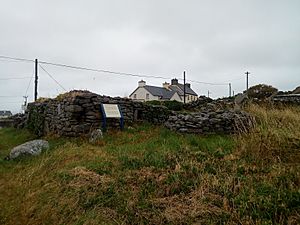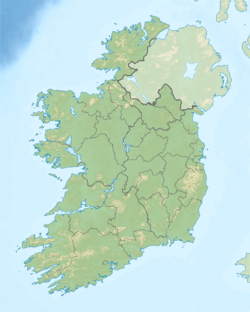Templesaghtmacree facts for kids
Quick facts for kids Templesaghtmacree |
|
|---|---|
|
Teampall na Seacht Mac Rí
|
|
 |
|
| 53°05′02″N 9°35′25″W / 53.083866°N 9.590158°W | |
| Location | Carrownlisheen, Inishmaan, County Galway |
| Country | Ireland |
| Denomination | Roman Catholic |
| Architecture | |
| Functional status | inactive |
| Years built | c. 8th–10th centuries AD |
| Specifications | |
| Length | 10.85 m (35.6 ft) |
| Width | 4.95 m (16.2 ft) |
| Number of floors | 1 |
| Floor area | 53.7 m2 (578 sq ft) |
| Materials | limestone |
| Administration | |
| Diocese | Tuam |
Templesaghtmacree is an ancient church located on Inishmaan, one of Ireland's beautiful Aran Islands. It is considered a National Monument, which means it's a very important historical site protected by the country. This old church tells a story from a long time ago, around the 8th to 10th centuries AD.
Where is Templesaghtmacree Located?
Templesaghtmacree sits right in the middle of Inishmaan. Inishmaan is the middle island of the three Aran Islands. You can find it just east of the modern Catholic church, which is called the Church of Our Lady and St John.
The History Behind the Name
The name Templesaghtmacree comes from the Irish language. It means "Church of the Seven King's Sons." This name remembers seven royal men who came to Inishmaan a very long time ago. They lived there as hermits, which means they lived alone and quietly to focus on their religious beliefs. For many years, people would travel to this church as part of a pilgrimage. A pilgrimage is a special journey to a holy place.
What the Church Looks Like Today
Templesaghtmacree was built as a rectangular stone church. It measured about 10.85 m (35.6 ft) long and 4.95 m (16.2 ft) wide. Today, only the lower parts of its walls remain. You can still see where a doorway and a window were in the south wall.
Inside the church, there is a special grave called Leaba Cinndeirge, which means "Cinndeirg's bed." This is believed to be the grave of a female saint. It has a cross slab, which is a stone with a cross carved into it. Close by, you'll also find Tobar Cinndeirge, which is a holy well. People believed these wells had special powers or were connected to saints.


